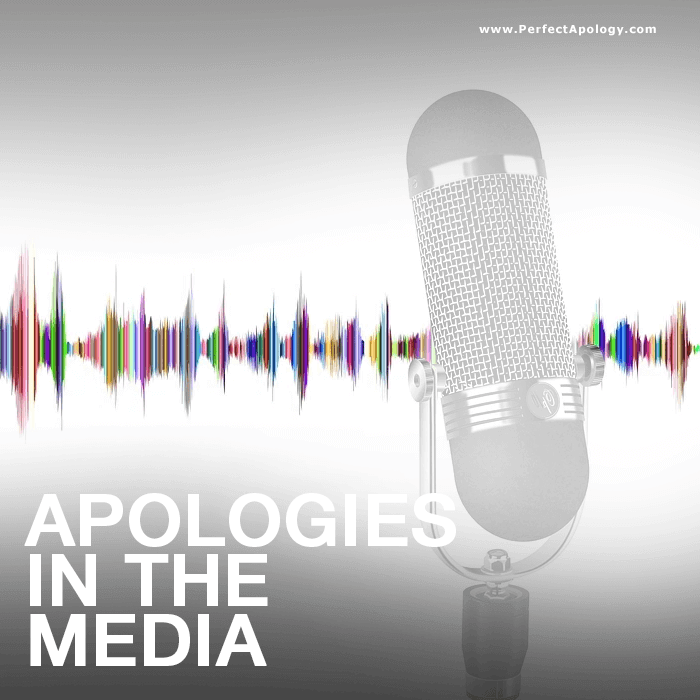Perfectly Terrible Apologies Case Study:
David Shuster & MSNBC, Don Imus & Rutgers
MSNBC's David Shuster posed the following question to his guests during an on-air political discussion about Chelsea Clinton's role in her mother's campaign: "Doesn't it seem like Chelsea's sort of being pimped out in some weird sort of way?"

It was the time delay between the insult and the apology that really hurt David Shuster and MSNBC, in the exact same way and for the exact same reasons similar delays have damaged other media reputations.
The delay (and initial refusal to even acknowledge the mistake) clearly implied that Shuster (like Chris Matthews several weeks earlier) didn't quite 'get it' until MSNBC brass explained it to him.
In an email exchange with Hillary Clinton's press secretary, Philippe Reines, shortly after the remark, Shuster initially defended his comments:
It is a fact that Chelsea has made calls to superdelegates, as your campaign colleagues have acknowledged.
It is also a fact that the campaign has reacted quite harshly to any media who have sought to interview Chelsea. That was the point.
By slamming any reporter who seeks to chat with Chelsea while simultaneously having Chelsea do campaign tasks such as trying to convince super-delegates to support her mom, that's the reference.SOURCE: www.huffingtonpost.com/taylor-marsh/david-shusters-emails_b_85837.html
Reines responded to Shuster's defiant position with the following observation:
I think we've each said what we have to say on this matter. Based on this email exchange, we're assuming two things: 1) You are not disputing that you said on air..., 2) You have no intention of apologizing for the above.
If media personalities want to avoid escalating mistakes like this they should take an immersion program in public relations crisis management.
The advice they should follow is pretty straightforward. A proper apology, should always include the ingredients we've listed here.
Shuster's initial apology the next day failed to satisfy any of these requirements.
Last night, I used a phrase... some slang about her efforts. ... To the extent that people feel I was being pejorative, I apologize for that. I should have seen that people might view it that way, and for that, then I'm sorry.
In others words, IF viewers MISTAKENLY MISINTERPRETED his comments then he is sorry FOR THAT—he is sorry for their error.
Shuster's second and significantly more delayed public apology managed to hit on at least a few important ingredients with the following sentiments:
I used a phrase that was inappropriate. I apologize to the Clinton family, the Clinton campaign and all of you who are justifiably offended...
As I said this morning on MSNBC, all Americans should be proud of Chelsea Clinton, and I am particularly sorry that my language diminished the regard and the respect she has earned from all of us, and the respect her parents have earned in how they raised her.
But by this time it was far too little and too late. As expected the apology was quickly dismissed by Hillary:
Nothing justifies the kind of debasing language that David Shuster used and no temporary suspension or half-hearted apology is sufficient...
Clinton wrote to NBC News President Steve Capus, who apparently had already called Clinton to personally apologize....
I would urge you to look at the pattern of behavior on your network that seems to repeatedly lead to this sort of degrading language...
There's a lot at stake for our country in this election. Surely, you can do your jobs as journalists and commentators and still keep the discourse civil and appropriate.
Obviously, apologies tend to work best when delivered to recipients who are prepared to forgive. But when the aggrieved community sees an opportunity to push the hurt a little further then no apology (especially a bad one) is likely to be good enough.
This is precisely where we are in politics post Trump—the primary imperative is never to be reasonable or sympathetic but to search for ways to generate support for your side.
When media personalities like MSNBC's David Shuster or Chris Mathews (or CBS/MSNBC's Don Imus which we discuss below, or Golf Channel's Kelly Tilghman, etc.) screw up by insulting Chelsea or Hillary (or the Rutgers University women's basketball team, or Tiger Woods, etc.) even perfect apologies may not work, for perfectly rational political reasons.
Imussed Up: Anatomy of a Failed Apology
Rutgers & The Don Imus Apology
Of all the celebrity mistakes and apologies that might provide some useful insights into the late Don Imus' collapse, the closest parallel is the Michael Richards' (Kramer) case—his repeated use of the 'n' word in a screaming match with audience members during a very bad comedy routine produced a similar backlash.
Unlike Imus, who bounced back on satellite radio, Richards' career did not survive despite repeated efforts to apologize to the African American community through two of its leaders—Jessie Jackson and Al Sharpton.
Successful apologies often depend on the recipient—some mistakes deserve a little more time and effort to correct, and some recipients demand a little more attention and sympathy.
Don Imus kicked off his apology tour by appearing on Al Sharpton's radio program (a move considered by many to be a huge mistake that compounded the problem).
Like Richards, the Imus apology strategy failed to turn the tied, because apologies work best when delivered to recipients who are prepared to forgive.
In both cases, however, some members of the aggrieved community weren't ready to let things go and used the mistake to exploit political agendas.
Ironically, the one group directly affected and offended by the Imus insult, the Rutgers University Women's Basketball team, did accept Imus' apology.
When the perfect apology guidelines are followed personal apologies almost always succeed, because you're dealing with one person or a small group.
Unfortunately for Imus the fact he was forgiven by the Basketball team become a secondary issue, it was essentially beside the point—the momentum caused by the insult affected far too many other people on a personal level.
This was an almost impossible mistake to correct completely.
The statement by NBC's Hal Rocker calling for standards to be maintained at MSNBC, the late Gwen Ifill's (a highly respected African American anchor at PBS) New York Times article commenting on previous racial slurs by Imus directed at her, and the press conference by the Rutgers Basketball team sealed his fate. There was no real coming back.
Apology Case Studies Takeaways
Fortunately, most errors for which our readers will have to apologize will never come close to Don Imus' reprehensible insult or Shuster's debasing language about of Chelsea Clinton both of which were done on-air.
The real error in these cases was not the initial mistake but the fact that the best, most sincere and meticulously worded apology was the last one to be issued by those who screwed up.
What is so fascinating (and perplexing) about the rising number of failed public apologies that occur even today, is that so few public figures (surrounded by public relations advisers) really know how to do it well, or quickly enough.
See more of our commentaries on public apologies or visit our research section for some case studies.


